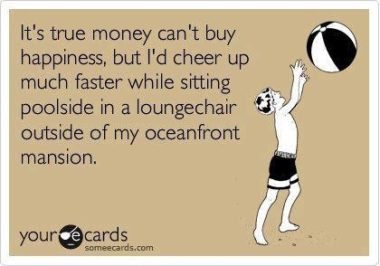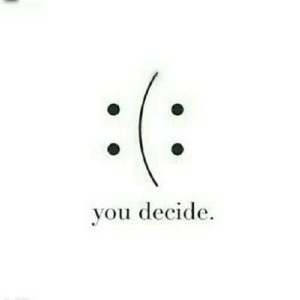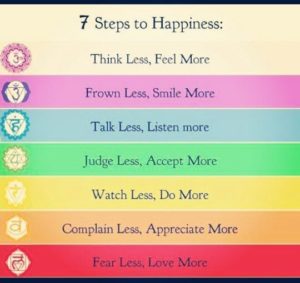
Real happiness does not come from external things. It comes from being able to determine our happiness based on our beliefs and how we interpret what happens to us. In this way, we take back control of our emotions, and become resilient in the face of difficulties. (Estimated reading time: 7 minutes)
“Happiness is a choice, not a result. Nothing will make you happy until you choose to be happy.”
— Ralph Marston
Let’s face it: everyone wants to be happy in life. But for many people, happiness is like a rainbow—captivating yet elusive. They keep chasing it, but never seem to reach it.
That’s because happiness is a vague concept that can’t be quantified. It’s an intangible state of being that can only be sensed with our emotions. It’s personal to each person and can only be defined by them.
Given the ambiguous nature of happiness, society has created a culture that associates it with material gain and pleasure. Any object, person or circumstance that instantly gratifies us and boosts our ego can come across as an obvious route towards happiness.
I’m not saying that wanting nice things and seeking popularity makes you dishonorable. It’s okay to have a healthy desire for these things, as long as we know that the type of happiness it brings is temporary and fleeting.

We see this play out in the lives of the rich and famous who have acquired fame and fortune. Many of them are still unhappy because they lead a shallow existence and they often resort to drugs, alcohol and other behaviors to fill up the emptiness they feel inside. Sadly, the cases of celebrities who die from their addictions are now all too common.
Their stories prove that finding happiness has little to do with what’s happening in the outside world but everything to do with how we operate in our inner world.
Happiness is a choice and it’s a state of being that we cultivate within us. It’s as simple as that—we don’t have to drive ourselves crazy, searching for the holy grail.
There’s a lot of power in owning our role in creating happiness. It puts us in the driver’s seat of our life and we no longer have to depend on external events or other people to make us happy. We know it’s futile to try controlling what’s not in our hands, but we can choose how it affects us.

Now you might say, “That’s all well and good but what if I’m facing dire circumstances in my life such as a heart-breaking divorce, financial pressures, unemployment or a debilitating illness? How can I be happy in such circumstances?”
Even though it’s more challenging to do so in such cases, it’s not impossible.
There have been plenty of people who were able to find joy in the most excruciatingly painful and hostile circumstances imaginable. Take holocaust survivor Victor Frankl, for example, who managed to find a sense of purpose while being tortured at the hands of the Nazis in World War II.
He truly believed that we have the freedom to choose our attitude and find the positive in any given set of circumstances.
Another exemplary role model in this regard is Nelson Mandela, who was incarcerated for 27 years for rebelling against a corrupt regime while fighting for a free society in South Africa. When asked about his time in prison, he said that his time there only strengthened his resolve against apartheid. Even in prison, he fought against it, and taught his inmate about white supremacy and how to fight it.
The incredible life stories of Frankl and Mandela prove that it is possible to find happiness in the toughest situations, if we live our life with purpose. They refused to play the victim and blame others. Instead, they chose to be accountable for their lives. Like turning lead into gold, they were able to transmute their experiences into one of learning and personal growth.

So if they could find meaning and happiness in such arduous situations, why can’t we? In fact, studies done by the Journal of Positive Psychology have found that simply the act and intention of trying to be happy can lead to a significant elevation in our moods and wellbeing.
Another psychology research study has shown that we all have a “happiness set-point” that’s determined by our upbringing and genetics. We tend to oscillate between this set point, which largely affects our sense of wellbeing. But according to experts, 40% of our happiness is within our control and that happiness is available to anyone who is willing to alter their attitude and approach towards life.
But happiness does take work and we need to adopt rituals and practices to keep us on the positive side of our happiness set-point. Life happens, both good and bad, and we should be prepared with the right knowledge and tools that will get us back to center.
Prioritize learning good self-management and interpersonal skills, and seek environments, opportunities and people who can increase your probability for happiness. And most importantly, develop the beliefs and behavior patterns that are conducive to your happiness.
Here are five reasons why you hold the key to your happiness:
1. You give meaning to events: No matter what happens to us, we have the final say as to what those events mean to us. For example, if someone makes a rude comment about your appearance, you can either take it to heart and get offended by it or you can see it as a sign that the other person is hurting and their words have nothing to do with you. We have to be especially conscious of how we interpret situations because our brains are naturally wired to scout for all that’s bad and threatening to us.
This phenomenon is called “negativity bias”, which causes us to react more intensely to unpleasant news, compared to how we’d respond to uplifting news. We have to make an extra effort to counter this.
2. You’re the architect of your belief systems: Our belief system is the mechanism that we use to make sense of the world around us. It’s essentially the stories that we tell ourselves that define our perspective. Our beliefs are shaped by a myriad of experiences that we’ve had over the years. It’s said that the most powerful beliefs that we have were spawned during our younger years, when we lacked the emotional maturity to interpret things in a self-preserving way.
The good news is that these belief systems can be deconstructed and replaced with healthier ones that will serve our growth and development. There are plenty of modalities and techniques that you can use to shift your negative thoughts, either on your own or with a therapist.
3. You set the expectations and standards for your life: I believe that it’s important to set high standards for our lives that can push us outside our comfort zone and motivate us to take big action towards our dreams. But with great expectations comes the necessity of managing your emotions so that you’ll be able to handle any obstacles and disappointments that come with the territory of reaching higher than most people.
Some say that it’s safer to stick with more ‘realistic expectations’ so that you don’t get disappointed. Whichever path you follow, you should own your power in determining how high you’re willing to raise the bar for your life and your ability to handle any challenges you encounter.
4. You moderate your inner dialogue: All of us have an incessant internal commentary that goes on in our minds throughout our waking hours. It’s a constant chatter that covers all kinds of subjects. “What am I going to have for dinner today?” “Will I be able to get that promotion?” “Why is my left eye twitching so much?” “I wonder what he really thinks about me.” “Why am I such a loser?” Like a sports commentator, we always have something to say about the game of our life. The content and tone of our inner talk is entirely based on how we feel about ourselves.
When we’re guided by love, we speak to ourselves with compassion. When we’re in fear mode, we sound harsh and demoralizing. In this post, I’ve addressed how you can speak to yourself with more kindness, by working with your inner critic.
5. Your reality is based on how much effort you’re willing to put in: Even though we can’t control the circumstances that we’ve been born into, we do have the ability to change them if we’re not satisfied. For example, if you were born into a poor family, you can work hard in school, attain a scholarship to go to college and land a lucrative job or even start a successful business. Or you can play the victim, wallow in self-pity and allow your circumstances to limit your potential to grow as an individual. It’s ultimately your choice when it comes to the amount of effort you’re willing to put into designing a life that fulfills.
Happiness is not something that we have to search for, but something that we create within our inner domain. Our thoughts are like a magic wand, capable of instantly transforming any negative experience into one that will help us prosper and evolve on our personal journey.
All my best on your journey,
Seline

Question for you: Do you believe that you determine your own happiness? What steps are you committed to shift your attitude?
Did you like this post? Sign up below and I’ll send you more awesome posts like this every week.

Thanks Seline, your post came just in time im about making a choice 2 be happy…I’m so depressed from so many broken relationships n marriage
Superb article seline!
Thank you for the very inspiring article. I firmly believe that you are in charge of your own happiness and that your thoughts become reality. Stay positive. Life’s amazing!
Thanks, glad to know that you found this useful! -Seline